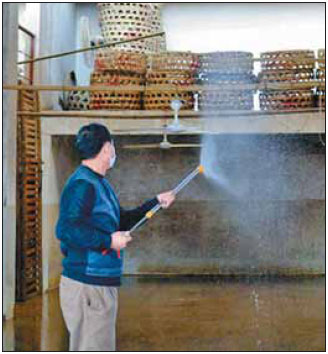Goose meat tests positive for H7N9 in Guangdong
|
All markets selling birds were closed for a day on Dec 23 - the first of three rounds of disinfection efforts to prevent and control the spread of H7N9 bird flue - in Guangdong province. By Lan Jun / Xinhua |
Samples of goose meat taken from a Guangzhou market in south China's Guangdong province have tested positive for H7N9 avian influenza.
Two goose meat samples and one sewage water sample from two poultry booths in a wet market in Zengcheng, a suburb of Guangzhou, tested positive, the Guangdong Provincial Center of Disease Control and Prevention confirmed on Sunday.
"It's serious that the water sample test is positive, because it means all the birds inside coops have the possibility of being infected with H7N9 avian influenza. The longer they stay in the coops, the risk of being infected rises," said Yang Zhicong, deputy chief of the Guangzhou municipal CDCP. The city government of Guangzhou, the provincial capital, is tracking the poultry source. The market was shut down on Saturday for three days so disinfection and cleaning can take place.
Meanwhile, 17 sales people working at nine poultry booths in the market are undergoing a weeklong medical observation. So far, they have shown no signs of being infected with the bird flu, Yang said.
Bird flu, or avian influenza, is a contagious disease of animal origin caused by viruses that normally only infect birds and, less commonly, pigs. It can be fatal to humans.
Six human cases of H7N9 bird flu have been confirmed in Guangdong province since August. None is from Guangzhou.
"According to expert assessments, Guangdong faces an extremely high risk of sporadic human H7N9 infections in winter and next spring," said Zhang Yonghui, head of the provincial CDCP.
"The cases may occur at any time across the province, and the Pearl River Delta region requires special attention," Zhang said.
The province has urged local agricultural and forestry authorities to strengthen daily management, tests and disinfection of live poultry markets and crack down on the illegal wildlife trade.
Chen Yuansheng, director of the provincial health and family planning commission, said antiflu drugs such as Tamiflu should be used within 48 hours by those who show flu symptoms such as fever and have been in contact with poultry.
The Chinese mainland has reported more than 140 human cases of the deadly virus since it emerged in March, including 45 fatalities.



















